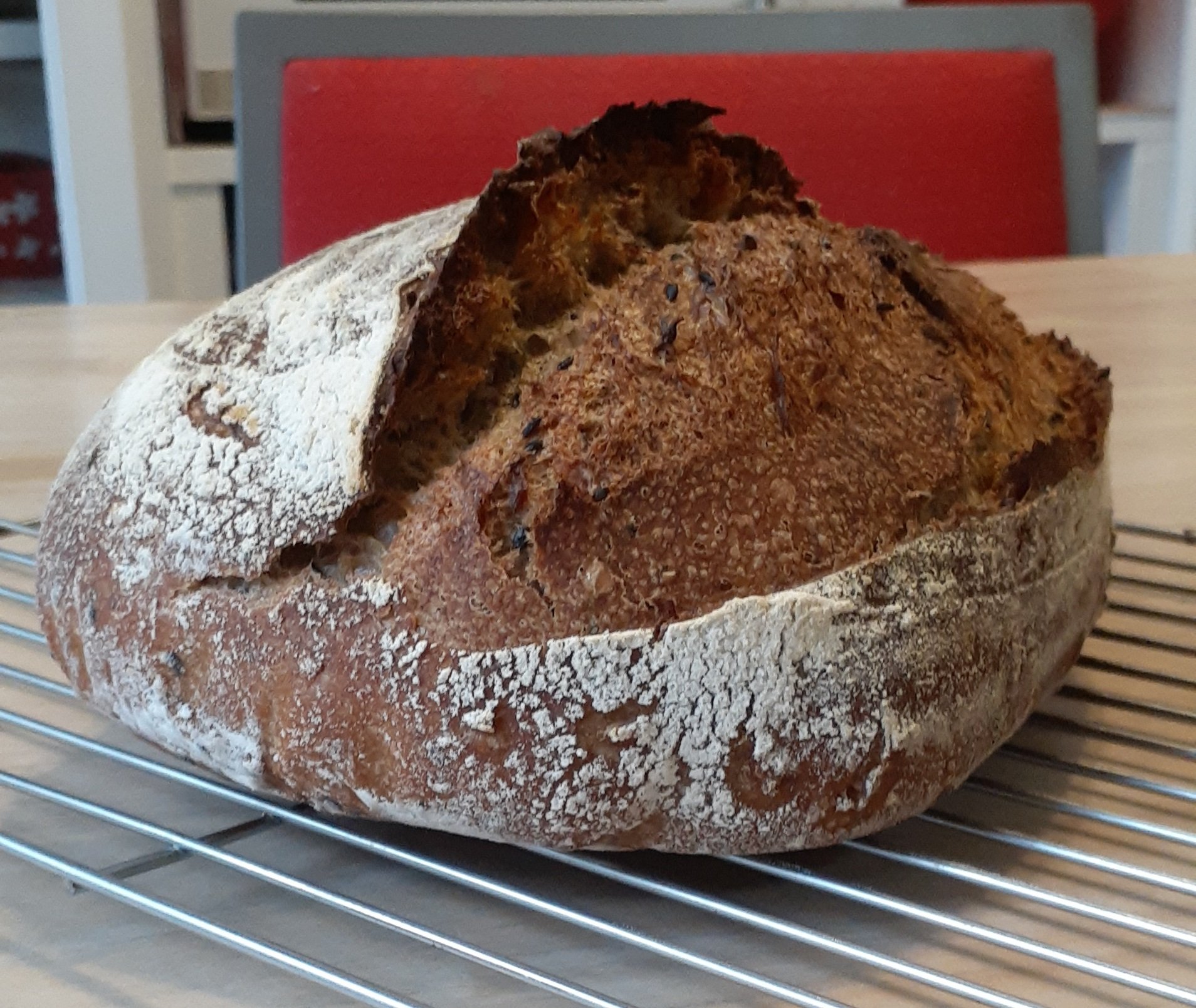Good old margherita.
I use the “pizzeria” flour from the company Caputo.
1kg Flour
600ml cold Water
40g salt
1/4 cube of yeast (or the equivalent in dry yeast, sometimes I use a whole packet)
Pre-Dough
I mix the cold water, salt and yeast and add half the flour (the half is super important)
Then I put a lid or wet towel on it and let it sit for at least 30 minutes (but optimally longer).
You should be able to see that pre-dough do produce get bubbly and produce CO2.
Dough
Then mix the rest of the flour in and knead that thing. Let it sit in the fridge for a day and then make 6 small balls out of the big one and put them into containers and into the fridge.
Oven
Its all about heat.
I use a G3 Ferrari pizza oven. They claim to do 400C (I think it’s less) and can be had for like 60-70 €/$ and there are similar ovens from different brands.
My dream electric oven would be a used professional small oven that goes to 480C. I’ve seen them for 200-400 €
If you’re using a regular kitchen oven get a pizza stone for nice results. An outdoor grill also works well with a stone.
You used the right flour, but you forgot the basil!
Looks amazing, but sad. Seeing you like this, without your basil leaves…
True. I shall return with a basiled one
Is there a reason you prefer large circles of cheese instead of having it grated on?
That’s how I have seen all margarita pizzas done.
Same! But I’m wondering if there’s some science behind the circles, or am I ok to grate stuff on for more even coverage.
You’ll find a lot of Italian chefs used julienned mozzarella/fior di latte, or batons, rather than big circular slices. There’s no firm rule that I’m aware of!
That said, trying to grate fresh mozzarella, instead of low moisture mozzarella (like is generally used on non-Italian style pizzas), would likely leave you with a big wet smeary mess.
I make a dozen large pizzas a week (I do a weekly pizza night for our small cottage bakery) and I cut my fior di latte into strips, then let them dry out a bit, covered on a wire rack in the fridge overnight before using.
It’s really hard to grate fresh mozzarella. It’s very soft and moist. The circles are because it comes in a sort of cylindrical shape and people just slice off thin pieces.
Margherita pizza is best with the absolute freshest mozzarella you can find. This often comes in big wet blob form and is much easier to slice into circles rather than grate. It won’t make the finished product any more or less of a Margherita pizza if it’s grated or chopped and spread more evenly if that’s your preference, but I kinda like the variation in bites you get with this configuration.
It’s the easiest. I also used to pull it apart with forks, but thethinn slices are the least work.
That’s the traditional italian way. Instead of using hard dry mozzarella that can be grated, you get super soft fresh mozzarella and slice and put on top.
I wish it had more browning personally.
Same
Is there a reason why you’re not using oil for the dough? Also (probably you already do but I’ll say for people reading) never mix salt and yeast directly, one should be added only when the other is already absorbed and well mixed. Salt contrast yeast chemical reactions. A simple way is to melt salt in the water beforehand
Oh shit In didn’t know that about the yeast - thank you : ) also ironic because sugar the opposite hahah.
I don’t put oil in because I’ve never seen it with my favorite recipes / cooks - I dip my pizza slices in oil before I eat them.
But there are a lot of doughs that do have oil in them, but they all seem less pizza-y. Maybe it rises less?
Will have to test
Oh, then I’m glad I’ve been helpful! Of course it doesn’t stop the yeast completely, but it hinders it.
About the oil, that’s interesting. Maybe it’s different in other countries because of different availability. Here in Italy it’s always used (similar amount to salt but 1~2% of the flour weight more compared to salt) Of course only extravirgin olive oil, not sure about the results with other oils
I usually add it last, after flour, salt, water and yeast.
Some pizzas also have some fresh oil on them after cooking, but dipping is too daring for my weak traditional heart.
But if the results aew good, that’s all that matters
That is one beautiful pie!!
Scrolled past it. (quickly)
My head: “was that a mini-pizza under a microscope?!”
Scrolling back…
“Oh, sadly just a regular sized pizza and a red kitchen appliance. Looks yummy, tho”
With the best device to make pizza @ home: Alfredo!!
Yum





